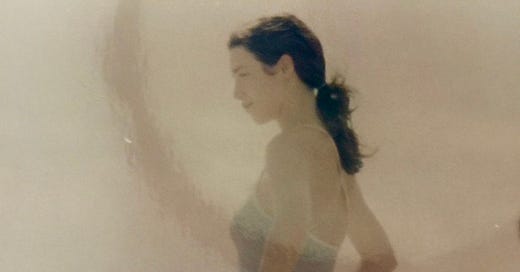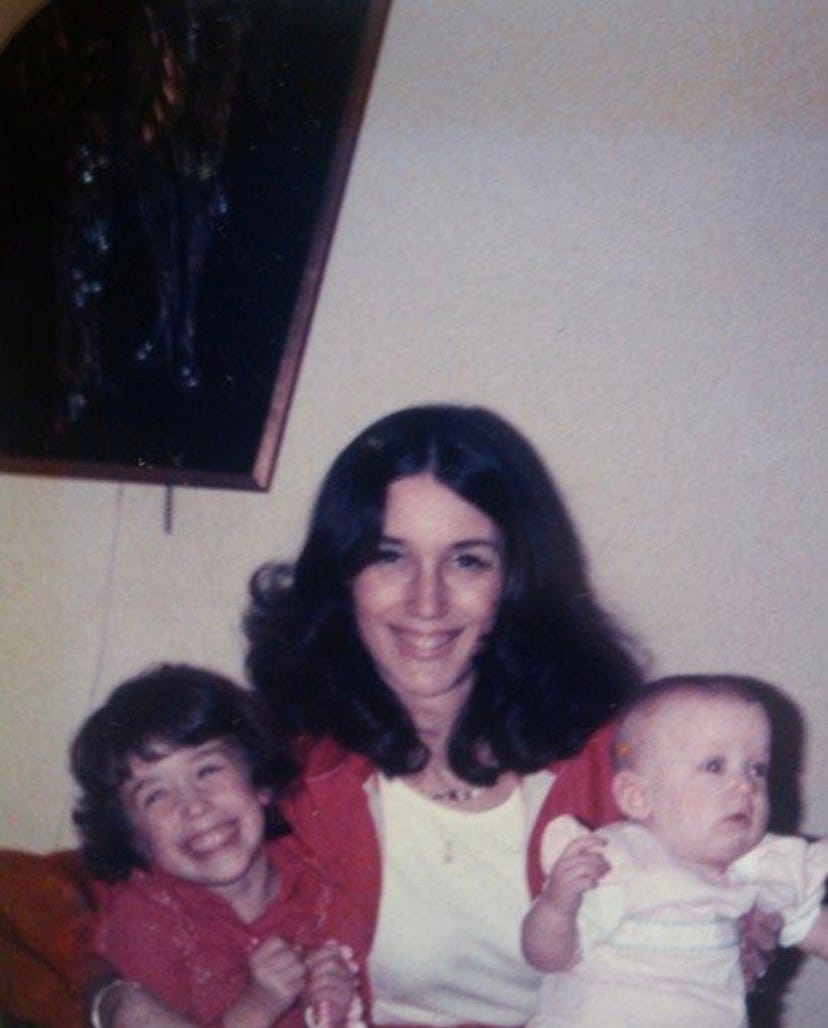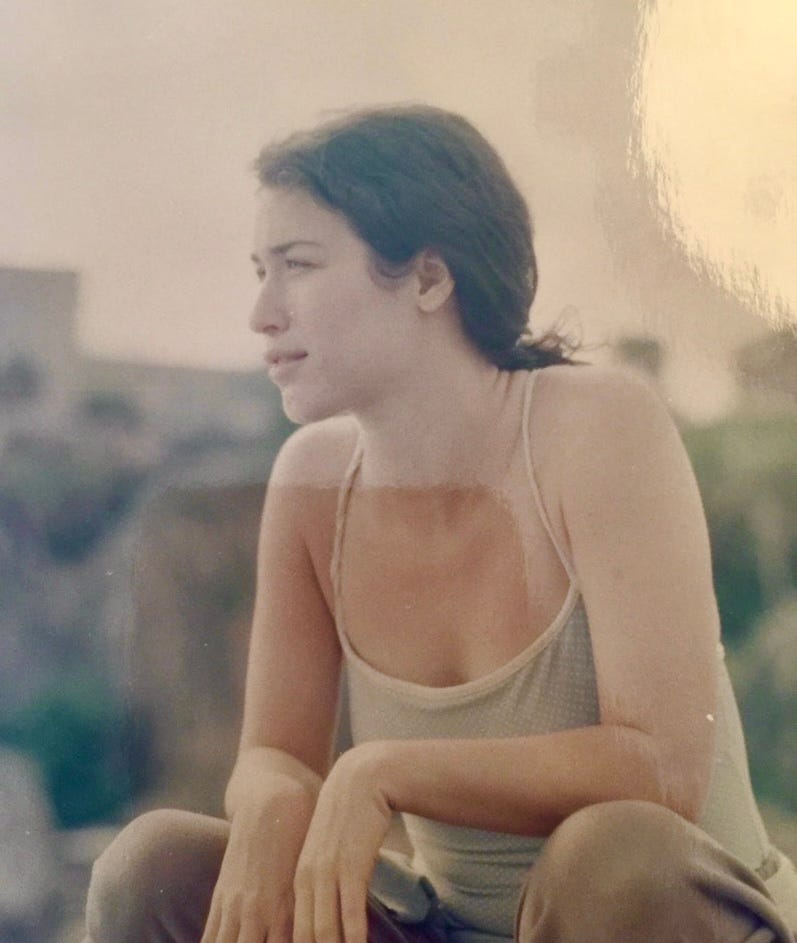My abortion story began with a string of consecutive nightmares. Train collisions. Planes falling out of the sky. Catastrophes. One after the other with a blonde-haired boy no older than age five making an appearance in each. We had observed each other, made eye contact the way you do in dreams, felt more than seen, never getting too close. In one, he held hands with my mother and walked along a white sand beach until a black tidal wave rose up from the sea and swallowed the sun before turning its attention onto them. Too paralyzed to move or make a sound, I forced myself awake before it could come crashing down. Yet after exhaling a reverberant, “Thank God that was just a dream,” I still couldn’t shake loose the nagging feeling that something was wrong. My stomach, my chest and every weighted movement told me so.
The next day after work, I dragged myself into a CVS along 1st Avenue in New York City and bought a pregnancy test. Minutes later, sitting on pieces of torn toilet paper in the store bathroom, two solid pink lines confirmed what I’d already assumed to be true, and I burst into tears. Not for joy. But rather because the same loud and affirming instinct assuring me since childhood that someday I’d be a mother, screamed louder: NO! THIS IS NOT THE TIME!
I went home and cried more, mostly because I was overwhelmed by how immediately inhabited I felt and how much I didn’t want to be; how guilty that made me feel; how confused and stuck in a polarizing tension between doing what I wanted vs what external expectations would have me do—perceived or not. I’d been raised in a liberal home and taught to think for myself. No one whose opinion mattered would’ve expected anything other than making the choice that best suited me. And yet still, I doubted myself, even gaslit myself in moments questioning whether it was natural to feel this way. The conversations that I’d had around pregnancy never addressed a more nuanced truth about the relationship between motherhood and womanhood—how the two under patriarchal constraints exist in contradiction to one another; and how burdensome the cultural expectation is that women should aspire to motherhood, to this mysterious, almost mythological status, regardless of timing or how it will impact her relationships—physically, sexually, economically, socially, emotionally, and occupationally.
That night, I called my then boyfriend, soon-to-be-husband, and shared the news, and although we disagreed on what to do, he said that he’d support whatever I chose. And he meant it. And he did. And when I eventually fell asleep, I dreamt about the boy again. My mother, too. This time, they stood side by side near the edge of a mountain cliff with their backs facing me. The sun shone bright, lighting up a clear blue sky and once again my voice choked in silence as I watched them walk closer to the cliffs’ edge. I wanted to shout and run towards them, grab them, but they fell off before I could, and I woke up with shallow breath and a heavy hollow ache from deep inside my chest. Within minutes, I called out of work and sat quietly for an hour or so—just to be sure—although I already was. And then, after making a silent prayer to the imaginary child that would not be, I called my doctor and scheduled an abortion.
The next day the procedure was done in a warm and homey office by an OB-GYN who ordered tomato soup in case I got hungry. Food was the furthest thing from my mind, but the gesture added a token of dignity to an experience that might have otherwise been shrouded in fear and shame—and possibly worse. My doctor talked me through the particulars of the procedure, its implications, what to expect and what resources I could call on for further care should I need or want it. She held my hand and legitimized the complexity of being a woman with an unwanted pregnancy. I listened with tears in my eyes, though not from sadness, but rather overwhelming gratitude for how loving she was, how much she normalized my choice, how generously she tucked me into a much larger community of women who felt exactly the same way. I was not alone, and she made sure that I knew it.
After the procedure, I left woozy and crampy with thick pads stuffed between my legs. Instead of asking my boyfriend to accompany me home—his emotion was more than I could carry in this moment—I asked my sister, who held my hand, too, most of the way to Brooklyn, and looked at me several times with sad eyes as if to say, “I know how devastated you must be.” I played along, smiled back, thanked her for the support. But I wasn’t devastated. I was relieved, and wanted to protect and cradle that bundle of truth close to my chest.
*
On a cold winter day 14 years later I turned 41. I wish I could find meaning in the palindromic nature of this. I cannot, but noted it, nonetheless. I was living with my two children, a daughter and a son, ages nine and six, and navigating a painful divorce. Also, my mother had pancreatic cancer with only months left to live.
My life felt like a catastrophic nightmare—blessings and all.
For my birthday, a new friend gifted me a telephone reading from a psychic medium, hoping that she’d offer some relief. Under different circumstances she might have as I tend to be a heat seeking missile for verbal reassurances. (I’m anxious.) But in this moment, powerless to help my mother from starving, from whittling down to bones, and dying in the hands of a merciless disease, a stranger predicting future events seemed stupid and meaningless. Terminal cancer is predicated on the absence of a future. I kept the appointment anyway. Why not. As an overstretched muscle already in extreme spasm, I would’ve tried almost anything to temporarily lessen the pain.
After we introduced ourselves, Elizabeth, the psychic, told me to sit comfortably while she centered herself. “Before we begin,” she said, “my job is to get information and share it. That’s it.” I said I understood. “Super. And you’d agree with me that everybody’s different, that some people believe in this, some believe in that.” Once again, I agreed. “Annnd you believe in mediums—that people can communicate with spirits who’ve passed on?”
“I believe in anything that feels real,” I said, uncharacteristically flat. “I believe that can be real.” And I meant it as I said it.
“I’m not gonna lie though, because I’m hesitant with what I’m about to tell you—just because I don’t know you and I’m not here to offend anybody.”
“Nothing you say will upset me.” Again. I meant it. I think. Elizabeth paused and let out an audible exhale.
“There’s been a spirit here with me all morning. He’s about 14 years old and has got blondish hair. I’m sorry, but he says that he’s your aborted child.” I stiffen just before I break. “He wants me to thank you for listening to his warnings years ago. He would’ve been sick had he been born and could be more helpful from the other side.”
“What?” I asked, trembling.
“He also wants you to know that he’s with the person close to you who’s sick right now. He says he’s watching over them, protecting them and not to worry. They’re surrounded by light. Totally safe. Totally protected.”
In a rush of agonizing release, tears and snot poured out of me. I tried hard holding it back as if I could have possibly contained the ocean. Elizabeth continued talking, pretending not to notice—or noticed and did exactly as she had promised; to deliver information and nothing else.
“Does this make sense?” she asked.
“Mhmm,” I offered back, barely able to muster the sound. She chuckled.
“He’s also telling me that he loves how your son dances and how you daughter plays music. I’m assuming you’ve got kids—"
“I’m sorry. I have to go” I said. “Thank you.”
I hung up the phone, barely able to catch a breath. My hysteria was thick, though not from sadness, but because this stranger knew my secret and delivered it back to me to affirm life in a long and horrible drawn-out moment pregnant with death. She bridged two impossible worlds and I knew then that my mother would be alright, no matter what, and that the child-that-wasn’t lived somewhere, fully imagined, connected to me, to her, to us in so profound a way that my head wouldn’t dare try to organize for sense. It didn’t need to because my cells were already doing the work, and within seconds I was calm.
*
The ancient Greeks had two words for Time: Chronos and Kairos. Chronos refers to clock time, chronological time, sequential time. Kairos refers to organic time and signifies a moment in which something occurs that disrupts everything that came before it. Kairos is the fulcrum point that separates the before from the after, when everything you once knew, or thought you knew, gets challenged, re-examined, like in the case of a birth or a death. Kairos is the moment when agony and courage collapse into one another—when a process fully takes place and arrives at its truth.
My abortion happened in Kairos time. It was the right and opportune moment to choose selfhood over parenthood and arrived at its truth the day it came around full circle. But looking back, the disconnect wedged between my head and heart (even in the short amount of time it took for me to decide what to do) makes me want to throw my arms around my younger self—and every woman—who’s tasked with having to sift through the accumulated brush of confusing messages that line our paths forward, especially regarding baby-making. Something like, “if you keep waiting for the right time you’ll be waiting forever,” on the surface is so seemingly benign, but underneath translates into something potentially more malignant. It’s a message of fear masked as concern intimating that women are only desirable for so long, that when bodies age and we’re past the fertile years that we’ll slip into oblivion. It firmly suggests, “Get it while you can, girl!” and drives home another clear and damaging message—that we are most valuable in the reflection of another’s desire to make us a mom.
Don’t get me wrong, I believe that for me, there has been no greater purpose than parenthood/parenting. It’s been my greatest privilege in this life. But my understanding of right vs wrong timing when it comes to pregnancy and childbirth is a question only to be answered by the individual herself. Any message keeping a person from listening to their nature is misguided. Dangerous, too. And— while bad timing can turn into a gorgeous miracle story for some, in other instances it can also just be wrong. The point is that we get to listen and decide. And when we do, we experience what it is to inhabit ourselves first, to grow ourselves into our rightful authority. In my case, the bad timing was the miracle itself, and had I not listened to my body, my dreams, and my heart, and looked to some external authority, like God forbid a government entity or religious organization—or any person that did not have my best interest in mind—to answer the monumental question of whether to bring another human being into the world, I would have missed it entirely.
Mindy is a counselor and coach who pulls from traditional training as a systems therapist and experiences from motherhoood, marriage and divorce to help people navigate big life transitions. You can find her at mindywaldercoaching.com.








I am breathless by the power of this story❤️